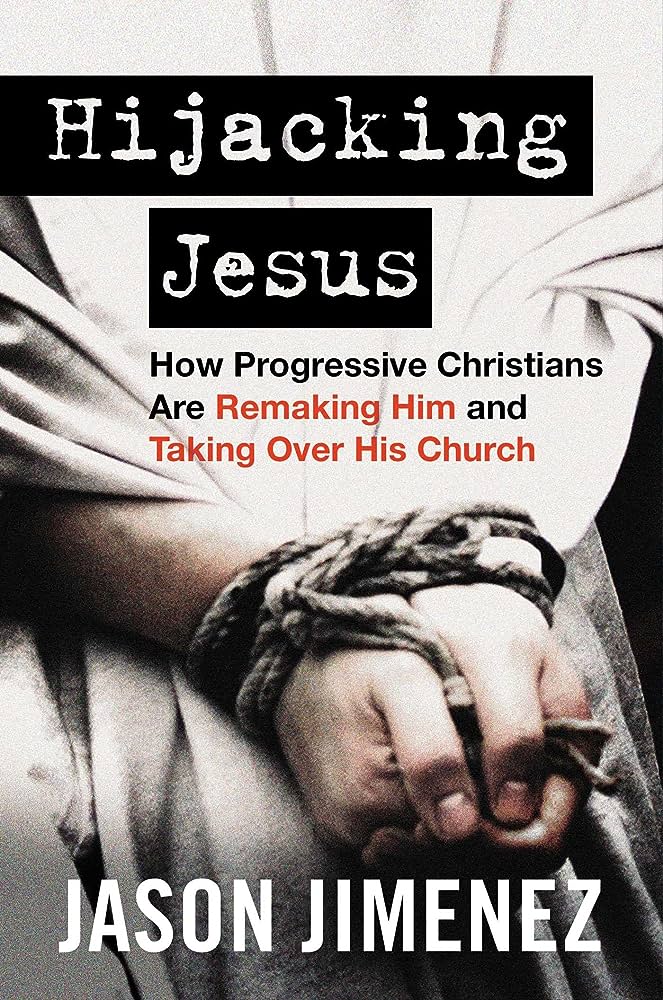
Over the past several decades there has been a slow creep of progressive thought working its way into Christianity. This thought, while seemingly radical on the surface, is to take Jesus from being our resurrected Savior and reinterpret Him as a Jewish mystic, or a sage teacher not capable of being divine or performing miracles.
In his latest book, Hijacking Jesus: How Progressive Christians Are Remaking Him and Taking Over His Church (Salem Books), author and podcaster Jason Jimenez takes apart this controversial narrative being painted by progressive Christians and seeks to spell out how these teachings not only uproot historic Christianity but attempts to overhaul the very identity of Jesus.
I recently sat down with Jimenez to discuss why progressive Christians are attempting to reinvent who Jesus was and is, the distinction between evangelical Christianity and progressive Christianity, and some prominent progressive theologians to be on the lookout for.
If you were trying to convince someone to pick up a copy of your book, Hijacking Jesus: How Progressive Christians Are Remaking Him and Taking Over, what would you say to them? What would your sales pitch be?
Essentially the sales pitch is if you know a little bit about Jesus and you have also learned that there are different views of Jesus, and you’re kind of confused, I’d get the book. So, if you have any questions about Jesus and you’ve heard varying sides on an issue. For example, whether He is the Son of God, or whether He performed miracles. That is biblical Christianity. But then you have other views that say, no, He was a Jewish mystic, He was a sage. So now you’re torn and you don’t know. That’s why I wrote Hijacking Jesus. It’s to help people put in proper perspective that according to Biblical Christians, we hold to the historical orthodox faith, right? Two-thousand years ago, Jesus Christ, the second person in the Trinity came and He lived a perfect life and fulfilled scripture. He died on the Cross for our sins according to Scripture. I Corinthians 15. He rose again from the dead. Matthew 28. And He ascended on high and called us to fulfill the Great Commission. And the church is built on the prophets and the apostles doctrine.
Ephesians 2:20, either that’s true or the claims that many progressive Christians are making, whether He’s a Jewish mystic or a woke teacher, an insurrectionist, or He’s a revolutionist like a lot of the professors in the academia world say. So there are a lot of versions, or I would say false portrayals of Jesus. If anyone is intrigued by that or confused and wants to know, let me just say this. People who are Biblical Christians, those who are followers of Jesus Christ, He’s the Son of God, He’s the savior of the world. If they want to know how to defend that against progressive Christians who falsely portrayed Jesus. Matthew 1:21, this book is for them.
As you have mentioned, over the last few decades, progressive Christian leaders have been theologically and spiritually motivated to take Jesus from historic Christianity as the resurrected savior and reinventing him as a Jewish mystic. Why do you think this has happened?
That’s a great question. I was just meeting with a good, good friend of mine. We were teaching together. He’s another fellow Christian apologist. And he asked me, “Jason, what is the largest demographic of Christianity?” It is progressive Christians. The thing that your audience needs to understand is that they’re built on postmodernity. So really the truth is wishy-washy. It depends on what camp of progressive Christians you’re in. A lot of them don’t refer to themselves as a progressive Christian. Some of them do, some of them don’t. But in this realm, you have these different views. They don’t hold specific tenets or beliefs. They don’t like that they kind of steer away from that because they don’t like to be locked down to certain rigid doctrines. So, they’re all about orthopraxy.
But no matter what type of progressive Christian you’re dealing with, they’ll have a false view of Jesus that’s anti-biblical Christianity. One of the movements that you’re seeing that has grown leaps and bounds within the camp of progressive Christianity is what I refer to in the book as “Mystical Progressive” Christians. And that’s mysticism. So, if you want to add some transcendentalism, if you want to add some new age stuff to your views of Christianity, kind of like a smorgasbord, from the Richard Rohr’s to Adia, who talks about this universal resurrected Christ, that is definitely in large degree, the movement that has taken rank above the other views of progressive Christians. Mysticism is mixing a layer of some form of teachings of Jesus. But again, it’s like Jesus is a sage. Jesus is seen as a moralistic teacher who was the enlightened one who personified this self-consciousness, this awareness. That has really become big. So now, what people are doing is, over time in America, new age spirituality stuff has been there, but it would never really mix with Christianity. Now what we’re seeing through a lot of these progressive mystical writers, they’re wedging the two together.
This book really delves into the distinction between Biblical Christianity and Progressive Christianity. Why do you make the distinction between the two?
In the book I address six doctrines to delineate between, and I give theological affirmative definitions for both. And again, it’s hard to not only define, but dissect progressive Christianity, because like I said, every camp kind of disowns the other camp to some degree. But there is a book that Roger Wolsey wrote called Kissing Fish. And in there, he gives more of a definitive outline. There were about 80 plus percent of progressive Christians who evaluated his breakdown of what progressive Christianity’s all about. They embrace it. Then, I’m going to define Biblical Christianity based on six doctrines of Jesus. But for progressive Christianity, one thing that’s so foundational to them is that God is not transcendent or immanent. They believe they’re not. So, they’re not theistic in their understanding of God.
They are actually pantheistic. What that means is that God is in the world as the world is in God. So, in that case, we don’t have a personal God in the body of Jesus. So, they denied Jesus as a son of God. He was just more of a manifestation of self-consciousness. They don’t believe that truth is absolute. Most of them don’t believe in Adam and Eve, so they don’t believe in original sin. And one of the most atrocious, horrific doctrines, according to the vast majority of progressive Christians is the doctrine of atonement. This idea that God senses his Son and his wrath comes upon him, stark naked, abused and battered, to wash us clean of our sins. They said it is an atrocious doctrine. So at the heart of progressive Christianity is a direct denial of the divinity of Jesus and also his atonement for our sins.
And lastly, they reject a literal, physical, bodily resurrection of Jesus. Therefore, they deny a literal, physical bodily reign of Jesus. Whereas in Biblical Christianity, we believe that Jesus is the second person of the Trinity. We are Trinitarian in our understanding of one essence with three persons. We believe that Jesus Christ was born of a virgin, that Jesus Christ performed supernatural activities, miracles to fulfill himself as the Messiah. He fulfilled prophecy. We believe that Jesus died on the Cross for our sins, that He was the lamb of God. He takes away the sins of the world. According to what John said in John 1:29, we believe that He was buried, and on the third day, He literally physically rose from the dead. And we are awaiting His second return, that He will come back literally, physically, and bodily. So, that is Biblical Christianity versus progressive Christianity.
Who are some prominent figures in progressive Christianity to be on the lookout for, people to steer clear of as an evangelical Christian?
They’re all over the map. Some of them are big YouTubers, some of them are celebrity pastors, some of them are in academia. They may not wear the branded progressive Christian on their hat or have an emblem, but they’re present among us, from the podcast world to local churches. And so to name a few, one of the bigger names that’s been around, he’s tied to the Jesus Seminar. He was in Oklahoma for many years and he was a pastor trying to address progressive Christians amongst conservatism. That was his whole attempt. His name is Dr. Robin Meyers. He wrote a classic book and did a video series, and he’s traveled the world teaching saving Jesus from the church.
Some of the younger progressive pastors who support Jesus being inclusive of LGBT stuff, same-sex marriage, are pastors and podcasters like Colby Martin. He has a book called The Shift about how he left conservative evangelicalism for progressive Christianity. And he says, in the opening of his introduction, “I’m not telling you what progressive Christianity is. That is a path for you to decide.” This goes back to the whole postmodernism thing I was talking about earlier. Another one, and she would not refer to herself as a progressive Christian, but it clearly is within her doctrine or teaching, and that would be Jen Hatmaker. She is a big name. Jen Hatmaker is one that we need to be concerned about. And that’s one thing I do in the book is I go from the academic people like Dr. Peter Enns, David Gucci, and Paula Frederickson, all the way to a celebrity pastor, to where you start being concerned about people like David Platt to some degree. I wouldn’t say he’s a full-fledged progressive Christian, but he has tendencies and leniencies towards that movement. And of course we have Andy Stanley. Now to be clear, Andy Stanley does not reject a bodily resurrection of Jesus, and he believes in the second coming of Jesus. He believes that Jesus was the second person in the Trinity. And again, that’s why I’m saying the elucidation of progressive Christianity is hard because it can masquerade itself differently in different pockets. So, fundamentally, progressive Christianity as an umbrella is a false religion. It denies those six doctrines. And depending on what progressive Christian you’re talking to, they may not deny those doctrines of Jesus per se, but they interpret Jesus as either a mystic, a woke teacher or an insurrectionist. Like Andy Stanley, his teachings are more of him being a woke teacher. So, he undermines the literal interpretation of Jesus’s teaching and starts taking that metaphorical take. That’s very dangerous.
After people have read Hijacking Jesus, what would you like to see people take away from the experience? What is your greatest hope for the book?
My heart’s desire is that people will fall in love with Jesus for who He is, and that they would worship him as Thomas did. My Lord and my God, that is my ultimate desire. I also pray that many people who’ve been messing around with Jesus and distorting Him and falsely portraying him, my heart and desire and prayer in putting this together was not to put words in the progressive Christian’s mouth, but to delineate between what true religion is that’s found in Jesus Christ and what true salvation and eternal life looks like. I would also offer that to the people who’ve been lied to and have been falsely portraying Jesus, that they would repent and then they would get right with God.

Republished with permission from Blogs.crossmap.com, featuring inspiring Bible verses about ‘Hijacking Jesus’ Author Takes a Stand on Progressive Christianity.
